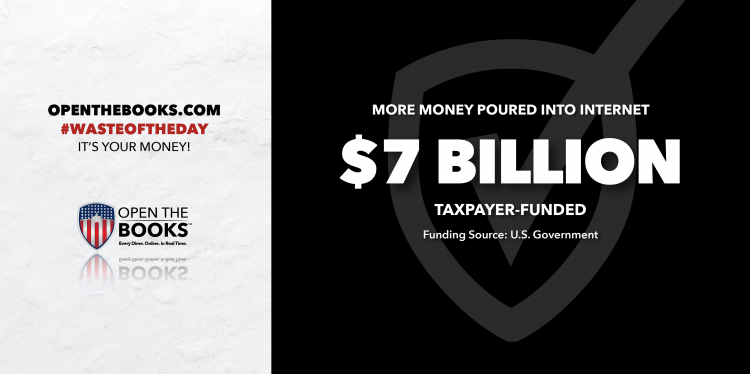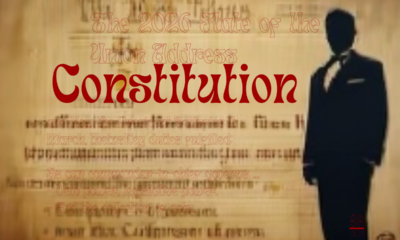Guest Columns
Waste of the Day: Congress Wants to Extend Covid-Era Internet Subsidies

Topline: The U.S. government spent $17.2 billion to give “emergency” internet service to 23 million people during the pandemic. The lockdowns are long over, but Congress still wants to invest another $7 billion into the plan.
History of the Internet subsidies
Key facts: The Affordable Connectivity Program started paying $30 monthly subsidies to 23 million families at the start of 2022 at a cost of $14 billion, following a similar one-year program that cost taxpayers $3.2 billion.
One-fifth of Americans currently qualify for the subsidies.

The Wall Street Journal dubbed it the “Free Netflix Plan” and suggested that it actually increased internet prices because customers have less incentive to try and find the cheapest rate.
Full subsidies ended this April, but a bipartisan group of 230 House members has sponsored a bill that would pour even more money into the program.
That may be a needless expense. The Journal reports that many internet providers don’t expect to lose subscribers even if the subsidies run out because their customers will still be able to afford service.
A recent Federal Communications Commission survey is lacking in transparency about how many Americans actually require internet subsidies.
The FCC’s fact sheet boasts that 77% of subscribers say their internet service would be “disrupted” if the Affordable Connectivity Program ends. But reviewing the survey in more detail reveals that only 16% of subscribers say they’d be completely unable to afford internet service.
The Wall Street Journal also reported that over $3 billion of the federal funds went to just one company, Charter Communications. T-Mobile received the next most with $1.05 billion.
The rest of the wasteful spending
Background: In addition to the subsidies, the 2021 infrastructure law gave broadband providers $42.5 billion in federal money to improve their service and lower their prices to $30 a month — a price point that allowed the Affordable Connectivity Program to provide free internet.
It’s all part of the $90 billion that Congress allocated for President Joe Biden’s “Internet for All” plan, which spans 11 programs across four federal agencies.
These programs have gotten more expensive over time. Previous reporting from OpenTheBooks.com revealed that one initiative to provide internet to rural areas spent $4,700 per household in 2019 but jumped to $18,000 per household in 2023. The price increase meant only half as many families actually benefited from the program.
Summary: The federal government should focus on providing internet to those who absolutely can’t afford it, not those trying to binge their favorite TV show.
The #WasteOfTheDay is brought to you by the forensic auditors at OpenTheBooks.com.
This article was originally published by RealClearInvestigations and made available via RealClearWire.
Adam Andrzejewski (say: Angie-eff-ski) was the CEO/founder of OpenTheBooks.com. Before dedicating his life to public service, Adam co-founded HomePages Directories, a $20 million publishing company (1997-2007). His works have been featured on the BBC, Good Morning America, ABC World News Tonight, C-SPAN, The Wall Street Journal, The New York Times, USA Today, FOX News, CNN, National Public Radio (NPR), Forbes, Newsweek, and many other national media.
Today, OpenTheBooks.com is the largest private repository of U.S. public-sector spending. Mission: post "every dime, online, in real time." In 2022, OpenTheBooks.com captured nearly all public expenditures in the country, including nearly all disclosed federal government spending; 50 of 50 state checkbooks; and 25 million public employee salary and pension records from 50,000 public bodies across America.
The group's aggressive transparency and forensic auditing of government spending has led to the assembly of grand juries, indictments, and successful prosecutions; congressional briefings, hearings, and subpoenas; Government Accountability Office (GAO) audits; Congressional Research Service (CRS) reports; federal legislation; and much more.
Our Honorary Chairman - In Memoriam is U.S. Senator Tom Coburn, MD.
Andrzejewski's federal oversight work was included in the President's Budget To Congress FY2021. The budget cited his organization by name, bullet-pointed their findings, and footnoted/hyperlinked to their report.
Posted on YouTube, Andrzejewski's presentation, The Depth of the Swamp, at the Hillsdale College National Leadership Seminar 2020 in Naples, Florida received 3.8 million views.
Andrzejewski has spoken at the Columbia School of Journalism, Harvard Law School and the law schools at Georgetown and George Washington regarding big data journalism. As a senior policy contributor at Forbes, Adam had nearly 20 million pageviews on 206 published investigations. In 2022, investigative fact-finding on Dr. Fauci's finances led to his cancellation at Forbes.
In 2022, Andrzejewski did 473 live television and radio interviews across broadcast, major cable platforms, and radio shows. Andrzejewski is the author of The Waste of the Day column at Real Clear Policy. The column is syndicated by Sinclair Broadcast Group, owners of nearly 200 ABC, NBC, CBS, and FOX affiliates across USA.
Andrzejewski passed away in his sleep at his home in in Hinsdale, Illinois, on August 18, 2024. He is survived by his wife Kerry and three daughters. He also served as a lector at St. Isaac Jogues Catholic Church and finished the Chicago Marathon eight times (PR 3:58.49 in 2022).
Waste of the Day articles published after August 18, 2024 are considered posthumous publications.
-

 Civilization3 days ago
Civilization3 days agoIran – the war begins
-

 Education4 days ago
Education4 days agoFlorida Teachers Unions Have Lost Their Way
-

 Civilization4 days ago
Civilization4 days agoState of the Union – a response
-

 Guest Columns2 days ago
Guest Columns2 days agoWhy all the Jew hatred?
-

 Executive4 days ago
Executive4 days agoWaste of the Day: Improper Payments Totaled $186 Billion in 2025
-

 Executive5 days ago
Executive5 days agoGavin Newsom, You’re Better Than This
-

 Accountability4 days ago
Accountability4 days agoSafeguarding National Security through Investment in Critical Minerals
-

 Civilization2 days ago
Civilization2 days agoPirates of the American Revolution












